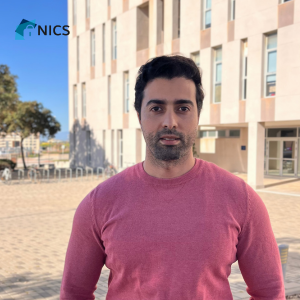Younes Assouyat
PHD STUDENT
Edificio de Investigación Ada Byron
C/ Arquitecto Francisco Peñalosa, nº 18
Ampliación Campus de Teatinos. Universidad de Málaga
29071 Málaga (Spain)
Phone: +34 951 952 934
E-mail: assouyat@uma.es
Education
- MSc. in Telematics and Telecommunication Networks, University of Málaga (Nov 2023)
- BSc. Telecommunication Engineering Systems, University of Málaga (Mar 2021)
Thesis
- MSc. Thesis: Trust Models for Internet of Things (IoT) Environments.
This master’s thesis focuses on implementing a trust model in the Internet of Things (IoT) environment, which is based on the behavior of devices. In contrast to traditional trust models, this model incorporates four distinct metrics: risk, threats, context, and reputation. The latter provides feedback to the model and is stored in the device’s history. These metrics are used to assess trust in the IoT environment, offering numerous benefits, such as adaptation to specific contexts, proactive risk identification, early threat detection, and device reputation evaluation. In addition to reducing the possibility of trust errors, this model adapts to constantly changing environments and allows for a more thorough assessment of trust, providing secure and adaptive interoperability between devices. Furthermore, it promotes continuous improvements in security, optimizes operations, and facilitates compliance with security and privacy regulations in IoT environments. The project includes a model simulator that facilitates the evaluation of device reputation in clusters while under the model’s supervision, without the need to physically implement these devices.
BSc. Thesis: Integrated Ultrasonic BPSK Modulator – Class-D Amplifier.
The present work focuses on the application of a robust modulation type known as BPSK on ultrasonic waves, using as the base of the modulator the structure of a class D amplifier, known for the great efficiency provided, this combination of BPSK modulation, ultrasonic waves and class-D amplifier, will give rise to an underwater communication system that combines both characteristics, robustness and efficiency. To get to this, the work has gone through the following stages, an introduction to the world of power amplifiers, an in-depth study of the characteristics and limitations of the components that are implemented in the electronic design of amplifiers, then the design and simulation of the Class D amplifier, this amplifier is used as base of the BPSK modulator after an introduction to the most common modulations and their characteristics. The conclusions of the work represent the unforeseen events and problems that have arisen with the development of the project, as well as the conclusions and each of the objectives that have been achieved thanks to the entire study of this work will be described. As the last section, possible future research works will be described and improvements will be sought to help simplify some of the problems that have appeared throughout the study.
Publications
Davide Ferraris, Carmen Fernandez-Gago, Younes Assouyat, Houda Labiod, Wang Haiguang, Javier Lopez
Trust dynamicity for IoT: How do i trust your social IoT cluster? Journal Article
In: Internet of Things, vol. 30, 2025.
@article{ferraris2025iot,
title = {Trust dynamicity for IoT: How do i trust your social IoT cluster?},
author = {Davide Ferraris and Carmen Fernandez-Gago and Younes Assouyat and Houda Labiod and Wang Haiguang and Javier Lopez},
editor = {Elsevier},
doi = {10.1016/j.iot.2025.101529},
year = {2025},
date = {2025-03-01},
urldate = {2025-03-01},
journal = {Internet of Things},
volume = {30},
abstract = {The Social IoT (SIoT) enhances the traditional Internet of Things (IoT) by integrating social relationships between device owners. This paper presents a dynamic trust framework specifically designed for SIoT environments, with the objective of providing security against malicious attacks targeting IoT devices. The framework offers a multi-dimensional analysis of trust, emphasizing the behaviours and contextual interactions of domestic devices. A prototype implementing the proposed framework is introduced and evaluated across three different use cases showing how to assess device reputation, enable dynamic device integration, and secure communication within device clusters. The evaluation results highlight the framework’s ability to enhance the reliability of device interactions and ensure seamless interoperability among devices utilizing different trust models. This significant improvement in trust management contributes to more secure and efficient SIoT operations. The findings underscore the critical role of dynamic trust adaptation and interoperability in creating a cohesive and secure SIoT ecosystem.},
keywords = {},
pubstate = {published},
tppubtype = {article}
}



